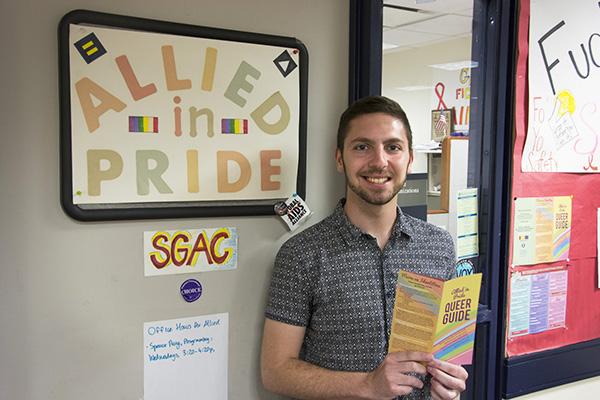Updated: Sept. 22, 2014 at 11:06 a.m.
Allied in Pride is planning to hold more social events this year to reinforce the idea that LGBT issues aren’t confined to its members.
President Robert Todaro said that over the past two years, the group has made a transition from being a smaller, education-based organization to a major group that bridges the LGBT community through social events. Now, he said he’s going to use larger events to advertise the diversity within the LGBT community.
Todaro, who has written for The Hatchet’s opinions section, said he wants to focus on connections among race, gender and sexuality through events such as one by the Latino Heritage Association next month that will feature a transgender Latina speaker.
He said the organization is planning to partner with the Association of Queer Women and Allies, the Feminist Student Union and the Multicultural Student Services Center for social events like formal dances and speakers.
“We’re increasing our appeal, and you’re really missing out if you don’t attend at least one of our events because we have some really unique educational experiences regardless of what our group is,” Todaro said.
The group will also plan events around its first-ever, year-long queer identities campaign, which Todaro said will educate students about “the diverse spectrum that is queer identity.” Later this year, the organization will host a week of events that center on awareness of queer identities, though specifics about the events have not yet been released.
Allied in Pride created a “Queer Guide,” a brochure written and designed by the group’s treasurer, Jay Fondin, that explains and defines different sexual identities. Fondin is a cartoonist for The Hatchet.
Fondin said it is “unfortunate but true” that many people are not aware of all the identities that qualify as queer. The brochure lists sexual orientations, genders and gender pronouns that extend beyond “male” and “female.” It differentiates between sex and gender and includes information about what it means to be transgender, to identify with more than one gender or to not identify with any gender.
“We never had any brochure materials to explain the enormously multifaceted identity that is queer identity,” Fondin said. “We’re raising visibility because we don’t talk about this enough.”
Former Allied in Pride President Nick Gumas set a precedent for collaborating with other large groups on campus when he launched Allied in Greek, an event where fraternity brothers dress in drag and perform on stage.
Todaro said the event is successful because while the funds go to the Trevor Project, a group that works to prevent LGBT suicides, its entertainment value prevents students from strictly labeling it an LGBT-only event.
Shane Windmeyer, executive director of Campus Pride, the largest national organization for LGBT college students, said it can be difficult for LGBT groups to reach out to students who may not come forward because they feel unwelcome or excluded from the campus community.
“Sometimes the students that are not heard on campus are the most invisible,” Windmeyer said. He emphasized the importance of “digging deeper into what’s not being said.”
Windmeyer pointed out that some LGBT groups may not know about particular students who identify as part of the queer community until campus organizations plan events to pique the interests of those students. He added that working with other organizations is key to communicating “a message of inclusion and support.”
Campus Pride calls GW “LGBT Friendly” in its rankings of campus climates nationwide, giving it 4.5 out of 5 stars.
Susan Rankin, a retired associate professor of education policy studies at Pennsylvania State University, said some campuses have established groups that recognize “multiple entities” within the LGBT community, like queer spirituality groups or groups for queer students of color.
At some institutions where LGBT students may feel uncomfortable, Rankin said these types of groups are “very important for information sharing.”
While Allied in Pride advocates for queer groups in general, the Association of Queer Women and Allies, or AQWA, focuses on providing an outlet specifically for women. After disbanding, the organization started up again last year and is now the second-largest queer group on campus.
“The queer community has a lot of different subgroups,” said Danielle Martin, the vice president of AQWA. “It’s difficult to put them together in one inclusive space.”
Martin said Allied in Pride takes an educational approach to LGBT issues, while AQWA tries to be more social. She said she supports Allied in Pride expanding its programming, but that Allied in Pride and AQWA will remain “very separate organizations with similar goals.”
AQWA holds weekly meetings to discuss different topics related to queer women and organizes social outings, such as trips to Nationals games. Allied in Pride’s listserv is comprised of around 1,000 students, while AQWA meetings have hovered at about 30 students in the past.
Martin added that AQWA typically cosponsors several Allied in Pride events, but that Allied in Pride is “more concerned with allies” than AQWA.







